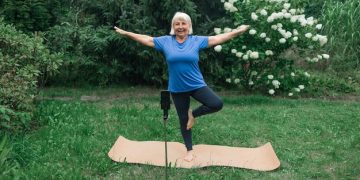Boost Immunity This Winter: 5 Top Strategies for US Adults

Boosting immunity this winter for US adults involves a multi-faceted approach, encompassing scientifically-backed strategies from vitamin optimization and gut health to regular exercise and stress management, all crucial for maintaining robust health during colder months.
As winter approaches, many US adults turn their attention to strengthening their immune systems. The colder months often bring a rise in seasonal illnesses, making proactive health measures more critical than ever. This guide delves into Boost Your Immunity This Winter: 5 Scientifically-Backed Strategies for US Adults, offering practical and evidence-based advice to help you navigate the season with a more resilient defense.
The Foundation of Immune Resilience: Understanding Your Body’s Defenses
Building a strong immune system isn’t about a single magic pill; it’s a comprehensive process involving multiple interconnected pathways within your body. Before delving into specific strategies, it’s essential to grasp the fundamental concepts of how your immune system operates and why winter often poses a unique challenge. The immune system is a complex network of cells, tissues, and organs that work together to protect the body from harmful substances like bacteria, viruses, and toxins. During winter, several factors can compromise this defense, including reduced sunlight exposure, altered dietary habits, and increased indoor time, which facilitates germ transmission.
The Role of Microbiome in Immunity
The gut microbiome, a vast community of microorganisms residing in your digestive tract, plays a profound role in immune function. Roughly 70% of the immune system resides in the gut, making a healthy and diverse microbiome paramount for robust defense. A balanced gut flora helps train immune cells, produce short-chain fatty acids critical for gut barrier integrity, and even influence the production of neurotransmitters that impact overall well-being.
- Maintaining a diverse diet rich in fiber and fermented foods supports a healthy microbiome.
- Probiotic supplements can be beneficial in certain circumstances to replenish beneficial bacteria.
- Avoiding excessive antibiotic use helps preserve the delicate balance of gut flora.
Environmental Factors and Immune Load
Cold weather itself doesn’t directly cause illness, but it can create conditions conducive to viral spread and immune suppression. Lower humidity in indoor environments, common during winter, can dry out mucous membranes, making them more susceptible to viral entry. Moreover, staying indoors more often increases exposure to circulating viruses. Understanding these environmental influences allows for targeted strategies to mitigate their impact.
Ultimately, cultivating immune resilience is about providing your body with the optimal conditions to function at its best. This involves not only addressing specific nutrient deficiencies or lifestyle habits but also understanding the broader biological and environmental context in which your immune system operates. By laying this foundational understanding, the subsequent strategies become more meaningful and actionable, empowering you to make informed decisions for your winter health.
Strategy 1: Optimize Vitamin D Levels & Micronutrient Intake
Vitamin D, often called the “sunshine vitamin,” is a crucial player in immune function, and many US adults experience insufficient levels, especially during winter months due to reduced sun exposure. Beyond its well-known role in bone health, Vitamin D modulates both innate and adaptive immune responses. Adequate intake helps activate T cells and macrophages, critical cells that hunt down and destroy pathogens. Optimal levels are generally considered to be between 30-50 ng/mL, though some experts advocate for slightly higher ranges.
Dietary Sources and Supplementation
While sunlight is the primary source of Vitamin D, dietary intake through foods like fatty fish (salmon, mackerel), fortified milk, and certain mushrooms can contribute. However, for many, especially in northern US states, supplementation becomes essential to reach optimal levels during winter. It’s advisable to consult a healthcare professional to determine your current Vitamin D levels and ascertain the appropriate dosage for supplementation, as excessive intake can be harmful.
- Fatty fish like salmon and mackerel are excellent natural sources of Vitamin D.
- Sunlight exposure for 10-30 minutes daily, when possible, aids natural production.
- Sublingual or oil-based Vitamin D supplements offer good absorption for daily intake.
Beyond Vitamin D, a spectrum of other micronutrients plays an indispensable role in supporting the immune system. Zinc, for instance, is vital for immune cell development and function, while Vitamin C is a powerful antioxidant that helps protect immune cells from damage and supports various cellular functions of both the innate and adaptive immune systems. Selenium and iron are also critical for immune competence.
The modern diet, unfortunately, often falls short in providing sufficient quantities of these essential micronutrients. Processed foods, while convenient, are typically nutrient-poor compared to whole, unprocessed options. This deficiency can quietly compromise immune function, leaving the body vulnerable to infections. Emphasizing a diverse diet rich in fruits, vegetables, lean proteins, and whole grains is the cornerstone of adequate micronutrient intake. When dietary intake is insufficient due to restricted diets, allergies, or individual needs, carefully selected supplements, guided by professional advice, can fill nutritional gaps.
Strategy 2: Prioritize Quality Sleep for Immune Rejuvenation
In an increasingly fast-paced world, sleep often becomes the first casualty of busy schedules. Yet, for US adults seeking to bolster their immune defenses, prioritizing quality sleep is a non-negotiable strategy. Sleep is not merely a period of rest; it’s a vital time for the body to repair, regenerate, and, crucially, for the immune system to perform essential functions. During deep sleep, the body produces and releases cytokines, proteins that help fight infection and inflammation. Chronic sleep deprivation, even just an hour or two less per night, has been consistently linked to a weakened immune response, making individuals more susceptible to colds, flu, and other infections.
The Science Behind Sleep and Immunity
Research shows that individuals who get less than 7-8 hours of sleep per night have a significantly higher risk of developing illness after exposure to a virus. Adequate sleep enhances the effectiveness of T-cells, which are critical for fighting intracellular pathogens like viruses. Furthermore, vaccination efficacy can be compromised in sleep-deprived individuals, demonstrating sleep’s pervasive influence on immune memory and response.
- Aim for 7-9 hours of uninterrupted sleep per night for optimal immune function.
- Establish a consistent sleep schedule, even on weekends, to regulate your body’s circadian rhythm.
- Create a relaxing bedtime routine to signal to your body that it’s time to wind down.
Practical Tips for Better Sleep Hygiene
Improving sleep hygiene involves adopting habits that promote consistent, restful sleep. This includes maintaining a cool, dark, and quiet sleep environment, avoiding screens and stimulating activities prior to bedtime, and limiting caffeine and alcohol intake, especially in the evening. For those struggling with persistent sleep issues, exploring cognitive behavioral therapy for insomnia (CBT-I) or consulting a sleep specialist can provide tailored solutions. Recognizing sleep as a fundamental pillar of health, alongside diet and exercise, empowers adults to make intentional choices that directly support their immune system, offering a robust defense against winter ailments.

Strategy 3: Embrace Regular Physical Activity (Sensibly)
Regular physical activity is one of the most powerful natural immune boosters, yet it’s often overlooked or misunderstood. For US adults, incorporating sensible exercise into daily routines can significantly enhance the body’s ability to fight off infections, particularly during the winter months. Moderate exercise mobilizes white blood cells, the body’s immune defenders, circulating them more rapidly through the body and increasing their capacity to detect and combat pathogens. This effect is temporary but cumulative; consistent activity leads to long-term immune benefits.
The “U-shaped Curve” of Exercise and Immunity
It’s crucial to understand the “U-shaped curve” of exercise and immunity: moderate exercise strengthens the immune system, but extreme, prolonged, high-intensity exercise can temporarily suppress it. This is why sensible activity is key. For most adults, 150 minutes of moderate-intensity aerobic activity or 75 minutes of vigorous-intensity activity per week, coupled with muscle-strengthening activities on two or more days, is recommended. This can include brisk walking, cycling, swimming, dancing, or even gardening.
- Incorporate at least 30 minutes of moderate-intensity exercise most days of the week.
- Balance cardio with strength training for comprehensive physical benefits.
- Listen to your body and adjust intensity during periods of illness or high stress.
Benefits Beyond Immune Function
Beyond its direct impact on immunity, regular physical activity contributes to overall health in ways that indirectly bolster immune resilience. Exercise helps manage stress, improves sleep quality, supports healthy weight management, and enhances cardiovascular health – all factors that create a more robust internal environment for your immune system to thrive. It also promotes better circulation, which helps immune cells and substances move efficiently throughout the body.
During winter, when outdoor activities might be limited by weather, being creative with indoor exercise options becomes important. Home workouts, gym memberships, or even simply taking the stairs instead of the elevator can make a difference. The goal is consistency and moderation, ensuring that physical activity serves as a supportive force for your immune system rather than an additional stressor. By committing to regular, sensible exercise, US adults can equip their bodies with a powerful tool for winter wellness, actively participating in their own immune defense.
Strategy 4: Master Stress Management: The Mind-Body Connection
Chronic stress, a pervasive aspect of modern life for many US adults, profoundly impacts the immune system. While acute stress can temporarily boost immediate defenses, prolonged exposure to stressors triggers a cascade of physiological responses that can suppress immune function over time. When under constant stress, the body releases hormones like cortisol, which, at elevated levels, can inhibit the production of important immune cells, reduce the effectiveness of existing ones, and promote systemic inflammation. This makes individuals more vulnerable to infections and slows down recovery from illness.
Understanding the Stress-Immunity Link
The mind-body connection is undeniable: what happens in our minds directly influences our physical health, especially our immune system. Chronic stress can shift the balance of immune responses, favoring inflammatory pathways and hindering antiviral immunity. This is why stressed individuals often report getting sick more frequently or having more severe symptoms when they do fall ill. Effective stress management is not a luxury; it’s a critical component of a proactive immune defense strategy, particularly crucial during the added pressures of the winter holiday season and shorter daylight hours.
- Practice mindfulness or meditation daily to calm the nervous system and reduce cortisol levels.
- Engage in hobbies or activities that bring joy and relaxation, providing a mental escape from stressors.
- Limit exposure to negative news cycles and social media, which can contribute to chronic anxiety.
Implementing Effective Stress-Reduction Techniques
Fortunately, there are numerous scientifically-backed techniques for managing stress. Mindfulness meditation has been shown to alter brain activity in ways that promote a sense of calm and can even modulate immune markers. Regular physical exercise, as discussed, is also a potent stress reliever. Connecting with nature, spending time with loved ones, practicing deep breathing exercises, and ensuring adequate sleep are all powerful strategies. Even simple acts like journaling to process emotions or listening to calming music can make a difference.
The key is to identify what works best for you and integrate these practices consistently into your daily routine. Stress management is not about eliminating stress entirely – an impossible feat – but rather about building resilience and developing healthy coping mechanisms. By mastering stress management, US adults can remove a significant burden from their immune systems, allowing them to allocate resources more effectively to fighting off winter pathogens and maintaining overall health and well-being.
Strategy 5: Embrace Balanced Nutrition and Hydration
At the heart of a robust immune system lies a foundation of balanced nutrition and adequate hydration. For US adults, particularly during the winter months, focusing on a diet rich in whole foods and staying well-hydrated provides the essential building blocks and optimal environment for immune cells to function efficiently. The unfortunate reality is that many modern diets are high in processed foods, sugar, and unhealthy fats, which can promote inflammation and diminish immune responses. A shift towards nutrient-dense options can make a significant difference.
Key Nutritional Components for Immunity
A truly immune-supportive diet emphasizes whole, unprocessed foods. Colorful fruits and vegetables are packed with antioxidants, vitamins, and minerals that protect cells from damage and support immune signaling. Probiotic-rich foods like yogurt, kefir, sauerkraut, and kimchi contribute to a healthy gut microbiome, which, as previously discussed, is intimately linked to immune function. Lean proteins provide amino acids necessary for antibody production and enzyme function. Healthy fats, especially omega-3 fatty acids found in fish, flaxseeds, and walnuts, have anti-inflammatory properties that can temper excessive immune responses.
- Consume a wide variety of colorful fruits and vegetables daily for a broad spectrum of nutrients.
- Include fermented foods in your diet to support a healthy gut microbiome.
- Choose lean protein sources and healthy fats for essential building blocks and anti-inflammatory effects.
The Indispensable Role of Hydration
Often overshadowed by discussions of food, hydration is equally critical for immune health. Water carries nutrients to cells, aids in detoxification processes, and helps maintain the integrity of mucous membranes in the respiratory tract – our first line of defense against inhaled pathogens. Dehydration can lead to dry mucous membranes, making them more vulnerable to viral entry. Aim for at least eight glasses of water daily, and more if you are exercising or in a dry environment. Herbal teas and broths can also contribute to hydration while offering additional immune-supportive compounds. Prioritizing both a balanced, nutrient-rich diet and consistent hydration forms a synergistic approach, providing your immune system with the comprehensive support it needs to stand strong against winter challenges.

| Key Strategy | Brief Description |
|---|---|
| ☀️ Vitamin D & Micronutrients | Ensure adequate Vitamin D, C, and Zinc through diet & supplements for immune cell function. |
| 😴 Quality Sleep | Aim for 7-9 hours of restful sleep daily to support immune regeneration and cytokine production. |
| 🏃 Regular Exercise | Engage in moderate physical activity to boost immune cell circulation and reduce inflammation. |
| 💧 Hydration & Nutrition | Maintain a whole-food diet and adequate water intake for overall cellular and immune health. |
Frequently Asked Questions About Winter Immunity
Winter presents challenges due to reduced sunlight exposure impacting Vitamin D production, increased indoor living promoting germ transmission, and drier air affecting respiratory defenses. These factors collectively put additional strain on the immune system, making it more susceptible to common seasonal illnesses.
A balanced, nutrient-rich diet is the cornerstone of immune health. For some, especially in winter or with specific dietary restrictions, supplements like Vitamin D or Zinc may be beneficial to address deficiencies. It’s best to consult a healthcare professional to identify any specific needs.
Most adults require 7-9 hours of quality sleep per night for optimal immune function. Adequate sleep allows the body to produce cytokines and other immune cells necessary for fighting off infections and maintaining a robust defense against pathogens.
Yes, while moderate exercise strengthens immunity, prolonged, intense exercise can temporarily suppress it. This “U-shaped curve” means consistency and moderation are key. Aim for regular, sensible physical activity rather than pushing your body to extremes, especially during winter.
Chronic stress significantly weakens the immune system by raising cortisol levels, which can suppress immune cell function and promote inflammation. Effective stress management techniques, like mindfulness or hobbies, are vital for maintaining immune resilience and overall well-being throughout the winter months.
Conclusion
Navigating winter as a US adult with a robust immune system is entirely achievable by embracing these five scientifically-backed strategies. From optimizing crucial micronutrients like Vitamin D and prioritizing quality sleep, to incorporating sensible physical activity, mastering stress management, and maintaining a balanced diet with proper hydration, each pillar contributes synergistically to your body’s natural defenses. These are not quick fixes but sustainable lifestyle choices that empower you to not only withstand seasonal challenges but also foster long-term health and vitality. By proactively implementing these measures, you equip your body with the resilience needed to thrive through the colder months, making informed decisions that benefit your well-being far beyond winter’s end.





